Tulsi Vivah Story Related by Swamiji, Ecstatic Haldi, Mehndi, Sangeet, Divine Tulsi Vivah on Nov 4-5 at RKT Dallas.
Close on the heels of the glittering Diwali Mahotsav, the DFW Community celebrated the last festival of the great Indian festival calendar in style – Tulsi Vivah or the divine wedding of Tulsi ji and Krishna Swaroop Shaligram ji. Dallas devotees were blessed to celebrate the festival in the divine presence of none other than Bhakti Saint Swami Mukundananda. The stupendous arrangements by the volunteers to create a divine wedding ambiance, from decorations, devotional Kirtans, Dandiya dancing, Haldi, Mehndi, Sangeet to elaborate wedding rituals, delightful wedding banter, and a sumptuous feast, ensured that everyone felt like a part of joyous celebrations.
Ladies and young girls thoroughly enjoyed the Mehndi ceremony, showing off their hands adorned with exquisite, creative, and fun Mehndi designs with the names of Radha Krishna woven in.
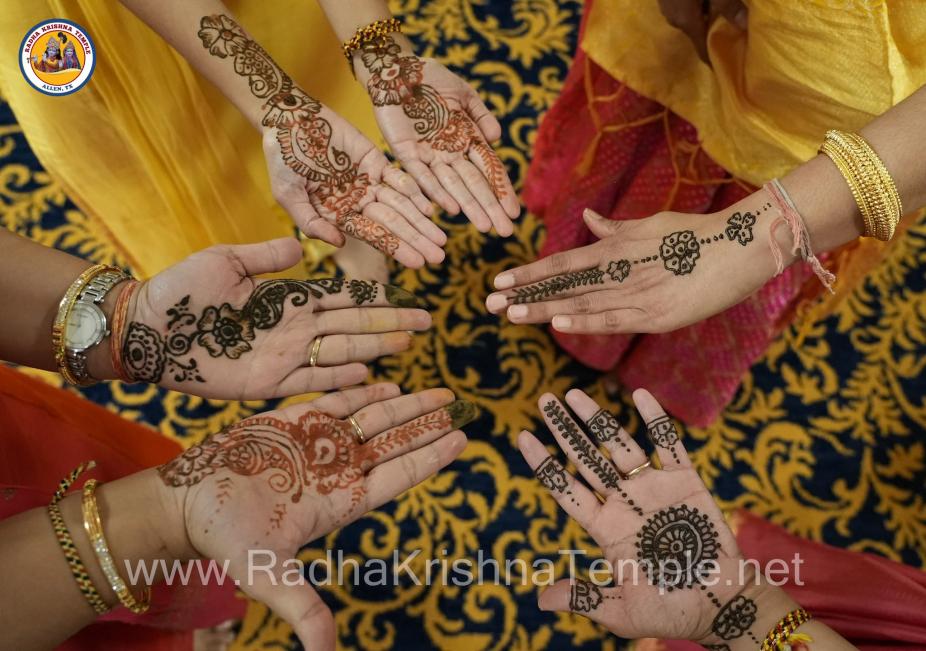
The families of the bride and the groom greeted each other and jointly invited Swami Mukundananda personally to grace the occasion of the divine wedding of Tulsi ji and Shaligram ji. Devotees lovingly applied Haldi to the deities. Everyone danced enthusiastically to Dandiya beats!
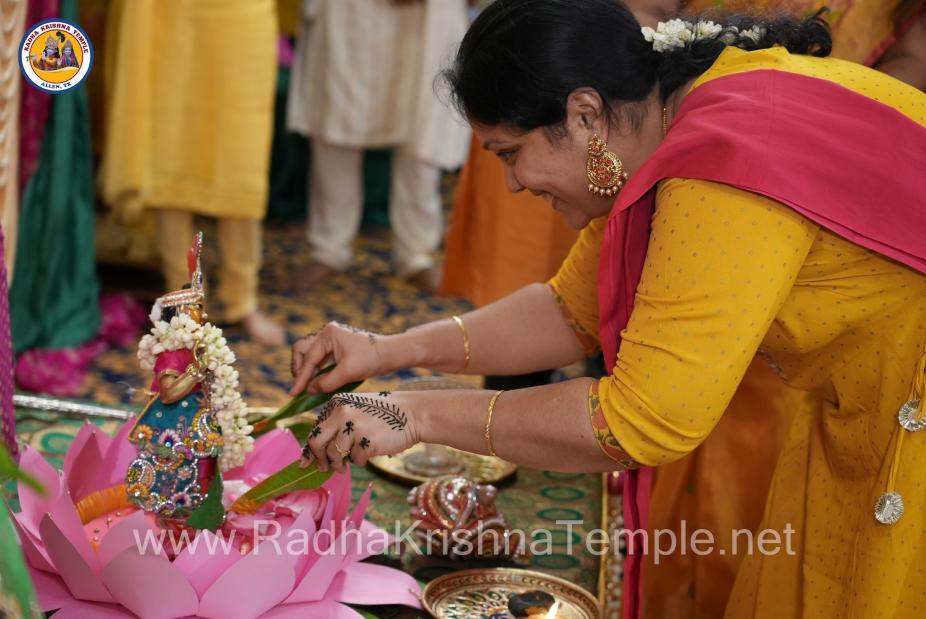
A Meet and Greet dinner with Swamiji gave many devotees the opportunity to interact with him in a lighter vein. Children from Bal Mukund presented delightful dances.
On the day of the wedding, Shree Krishna in Shaligram Swaroop and Tulsi Devi were welcomed by devotees with alacrity and merriment. The wedding rituals were performed as hundreds of devotees, who had offered their own sevas in the form of jewelry, flowers, fruits, garments, etc. looked on with love. The whole event was full of blissful moments.
Every festival is an opportunity to deepen our connection with God and Guru in selfless devotion and service. However, when saints who are always in divine consciousness preside over festival events, attendees benefit tremendously from their association. Their divine knowledge helps us to appreciate and elevate our devotional sentiments from the mundane to the esoteric.
Tulsi Vivah Story: Spiritual Significance
Swamiji related the spiritual significance of Tulsi Vivah with respect to souls on the path of Bhakti. God and their eternal associates incarnate on the earth and perform divine pastimes for the benefit of the souls – this is God’s way of finding eligible souls who are yet advanced sadhaks (practicing aspirants) to promote for eternal devotional service in the divine abode of Golok. He also graces the souls to come in future Yugas, with his names, forms, pastimes, qualities, abodes, saints so that anyone in any age can take advantage of these spiritual resources to develop faith and devotion in Him and attain Him.
However, since not all souls are eligible to participate directly in the Leelas of God during his descension, he also mercifully takes the “Archa Avatar” or the deity form. This enables all souls to benefit from offering their prayers and service to God – the astonishing fact is that the grace obtained from worshipping the deity form is identical to worship of the divine incarnation.
In this context, Lord Vishnu is Shaligram Devata and Tulsi Devi is Vrinda Devi - a powerful, eternal, divine associate of Shree Radha Krishna in Golok and the personality for whom Vrindavan is named! But how did they come to take on these forms? Any pastime of God, as we already know is solely for the benefit of the souls on the material plane and they perform different levels of Leelas or pastimes in different abodes, depending on the spiritual consciousness of the souls.
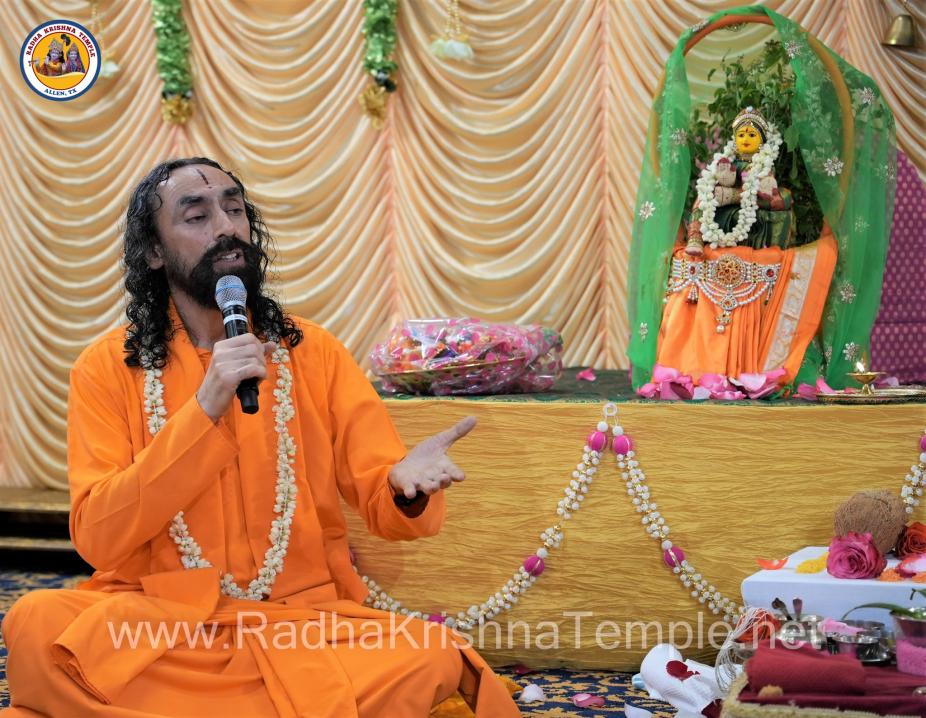
Tulsi Vivah Story : Tulsi ji is Vrinda Devi an Expansion of Radha Rani
Vrinda Devi is the commander in chief of the divine abode of Vrindavan and an expansion of Radha Rani – she is the one responsible for making Vrindavan Dham suitable for the divine Nitya Leelas of Radha Krishna in their eternal form of 16-year-old youth. She also facilitates the Leelas of the divine couple. Hence Vrinda Devi is also considered Bhakti Devi. Worshipping her blesses us with selfless devotion to Shree Radha Krishna.
Vrinda Devi , in one incarnation on planet Earth was a beautiful and pious demon princess, married to Jalandhar, a demon. Such was her steadfast devotion to her husband that he was protected by the force of her virtue - if she was faithful to him, he was invincible. Jalandhar, blinded by his perceived strength, declared himself the lord of the oceans and laid claim on the precious items emerging from the ocean during the “Samudra Manthan” or the great churning of the ocean to obtain immortalizing nectar. This created conflict with the celestial gods. They appealed to Lord Vishnu for help. When Jalandhar was not at home one day, Lord Vishnu took Jalandhar’s form and united with Vrinda. Unknowingly her vow of faithfulness was broken, and Jalandhar was easily killed. When she found out, she was both annoyed and pleased. She cursed Lord Vishnu to become separated from his divine consort Lakshmi since he had cheated her. This curse was fulfilled in Ramavatar. She also cursed Him to become a stone. So, the Lord agreed to incarnate as a stone (Shaligram). She was also pleased that the Lord had come to deliver her. Vrinda invoked yogic flames and immolated herself with her husband Jalandhar’s head in her lap. Lord Vishnu liberated her soul and told her that she would reincarnate as the Tulsi plant. From Vrinda Devi’s ashes sprung the Tulsi plant. Lord Vishnu then transferred her soul to the Tulsi Plant and declared that he would accept any offering only if it was offered with Tulsi leaves.
Due to her devotional nature, Lord Vishnu said He Himself would marry her every year on Krishna Ekadashi Day! So, Vrinda Devi of Golok, the eternal associate of Shree Radha Krishna, is Tulsi Devi in Vaikunth and Tulsi Devi on planet earth.
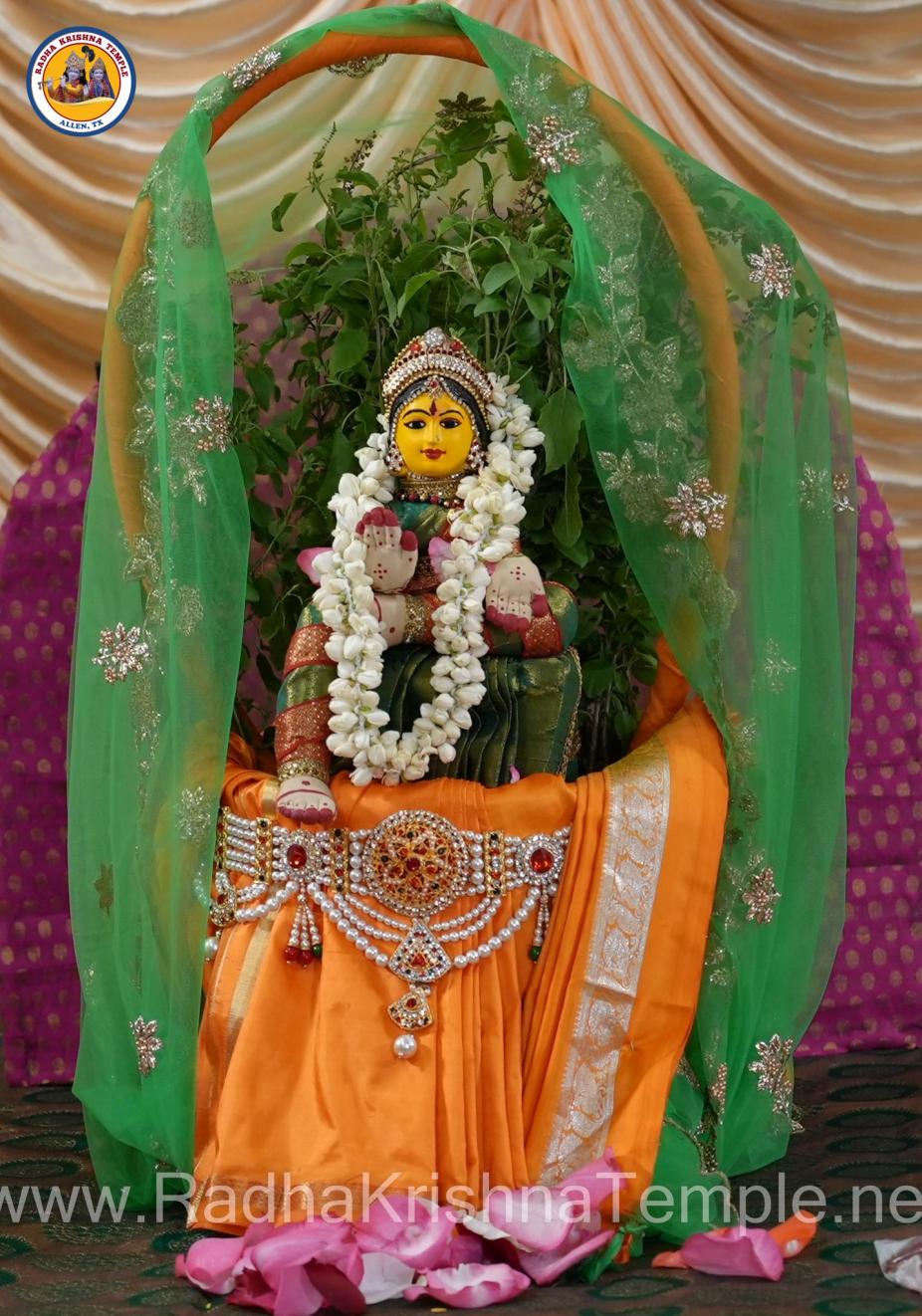
Tulsi Vivah Story: Opportunity to Perform Tulsi Vivah is a Rare Divine Blessing
Swamiji highlighted an important point – there are different Leelas or pastimes because there are different levels of souls: In divine Golok Shree Radha Krishna are eternally youthful and there are no childhood pastimes. Only Madhurya Bhaav pastimes are performed in Golok. Secondly in Golok there is no concept of marriage as that is an eternal abode. Swamiji joked that a yearly marriage ritual is possible when the couple keeps getting divorced simultaneously every year.
It is only when the Lord descends to the earthly plane, with his eternal associates that he performs pastimes of Dasya, Sakhya, Vatsalya Bhaav alongside Madhurya Bhaav, and the eligible souls get an opportunity to serve Him as an apprenticeship before becoming fully qualified for the divine abode. King Janak who was also known as Videha Raj – one who was beyond the body, was fortunate to become the father of the divine Mother of the Universe (Sita Ji) and perform Kanyadaan rituals when she got married to Lord Ram. Sita ji is thus also known as Vaidehi. King Janak being beyond the body, was extremely qualified, and we cannot aspire for the same position as ordinary souls.
However, when the Lord descends in the Archa Avatar, or the deity form, the souls in the material plane get the opportunity to do service in the modes of Dasya, Sakhya, Vatsalya Bhaav. Anyone who gets the opportunity to be present and/or offer any seva at the divine pastime of Tulsi Vivah is extremely blessed.
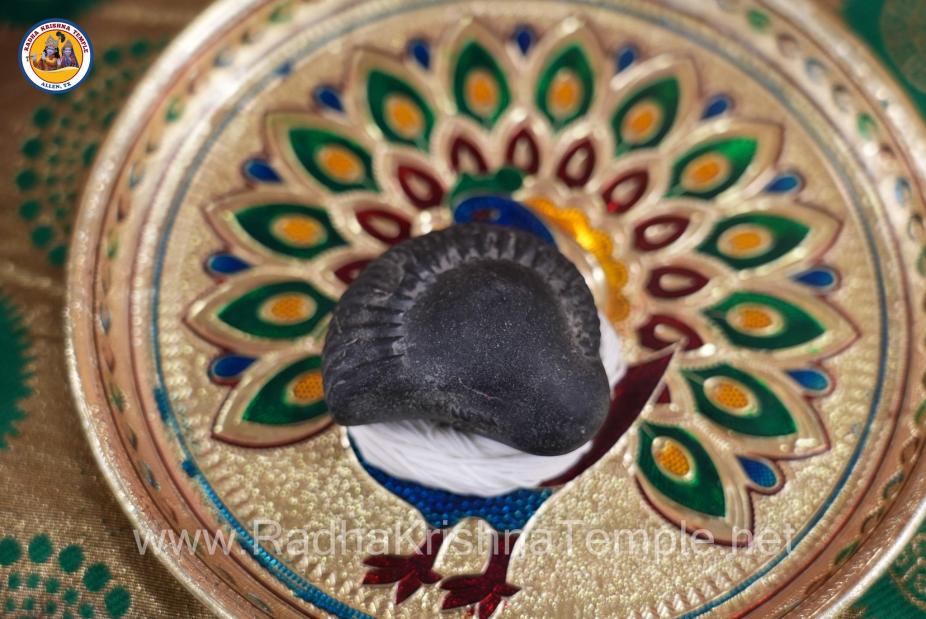
Tulsi Vivah Story: God’s Grace is Infinite
Swamiji reminded everyone of the importance of gratitude for the divine blessings we receive. Blessings in our life work to transform us to the extent that we realize them. When we are sincerely and constantly thankful for everything we have received, the doorway to the infinite storehouse of God’s grace opens and we receive even more. This helps us become qualified to one day participate in the pastimes of God during His divine incarnation, and then eventually serve Him in His eternal abode by His grace.
The true celebration of any festival is to spend it in service of the Lord or his representative, the Guru. The hardworking devotees of the Radha Krishna Temple excelled themselves in the arrangements for the divine wedding of Tulsi ji and Shaligram ji. Swami Mukundananda highlighted their dedication, taking an example of beautiful paper lotus on the altar. He marveled at how the volunteer who devoted their time to make this lotus must have spent hours to cut the paper into various shapes and arrange it to form a lotus. Similarly, he pointed out that each wedding arrangement was a result of the selfless devotional intention of the volunteers that contributed to the resplendent, divine ambience of the event. Swamiji was also highly appreciative of the efforts of Pandit Kaushik Kumar Purohit in conducting the rituals in an excellent manner.
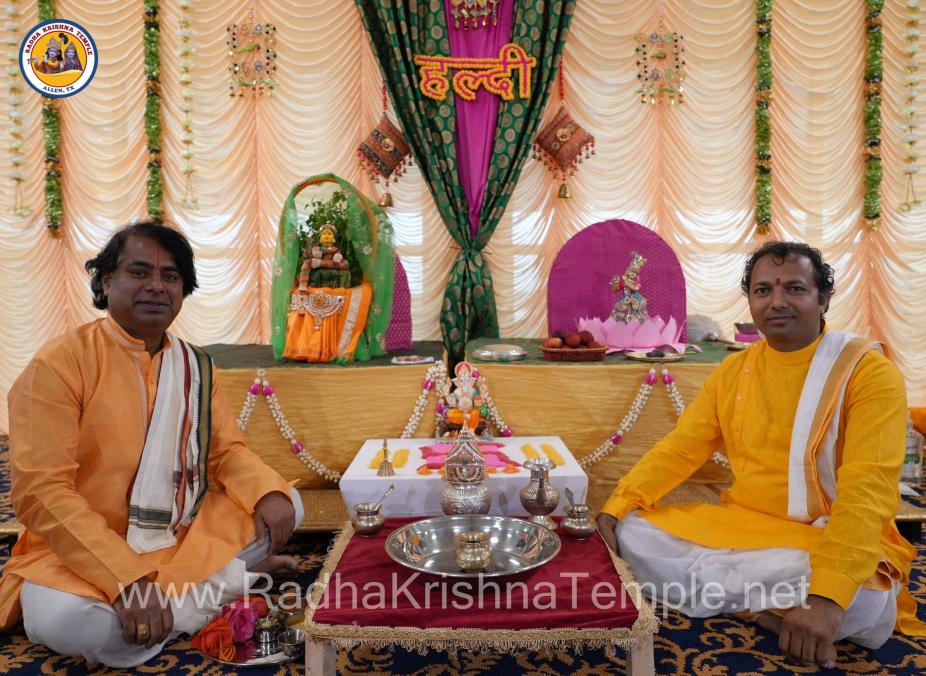
Tulsi Vivah is one of the most significant festivals for Radha Krishna devotees as it reminds us of the mercy of God and His love for the fallen souls. By praying to Bhakti Devi, Vrinda Devi, Tulsi ji, we become purified to develop selfless love at the lotus feet of Yugal Sarkar Shree Radha Krishna.
Shree Krishna is said to reside in Tulsi ji and even remembering, seeing, smelling, touching, or serving the Tulsi plant is purifying.
tulasī-dala-mātreṇa jalasya chulukena cha
vikrīṇīte svam ātmānaṁ bhaktebhyo bhakta-vatsalaḥ Hari Bhakti Vilas (11.261)
“If you offer God with sincere love, just a Tulsī leaf and as much water as you can hold in your palm, He will offer Himself to you in return because He is endeared by love.
Jai Tulsi Jai Shaligram!
Volunteer Note: We hope that you enjoyed reading this blog. Our goal is to spread the spiritual significance of celebrating Hindu festivals for spiritual transformation. If you missed any of the blissful divine festival celebrations or Swamiji’s lectures on these occasions, simply visit radhakrishnatemple.net/blog to catch up! And next time…try to attend IN PERSON or ONLINE at radhakrishnatemple.net/live
Share this Tulsi Vivah Story blog with your friends and family.
WATCH BEAUTIFUL GLIMPSES ON FACEBOOK

